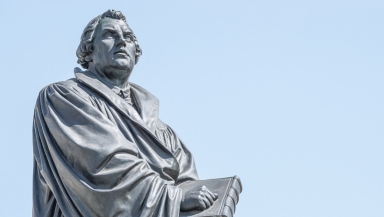
In the quiet town of Eisleben, Germany, in the year 1483, a baby boy named Martin Luther was born. Little did anyone know that this child would grow up to become a pivotal figure in the history of Christianity, leaving an indelible mark on the faith that has shaped Western civilisation.
Luther's journey into the world of theology and religious reform began in an unexpected way. One day, while taking a solitary walk in a field, a thunderstorm erupted around him. Faced with the power and fury of nature, Luther found himself making an earnest promise to God. He vowed to become a monk if he survived the storm. Although it may have seemed like a fleeting commitment at the time, Luther would go on to honour this promise in a profound way.
As a young man, Luther's path initially led him toward a career in law, following his father's wishes. However, a near-death experience during that thunderstorm lingered in his mind, and his spiritual journey took a different turn. He felt an inner calling that could not be ignored, leading him to enter the Augustinian Monastery in Erfurt, where he would dedicate his life to God.
Within the walls of the monastery, Luther immersed himself in the study of the Bible, theology, and philosophy. It was here that he began to develop a deep understanding of Scripture, which would later lead him to question certain practices of the Catholic Church.
One practice that troubled Luther deeply was the sale of indulgences. The Church claimed that these indulgences could grant remission of sins in exchange for monetary donations. Luther's growing understanding of the Bible led him to challenge this practice and the broader authority of the Church itself. He believed that salvation was a matter of faith alone and that the Bible should take precedence over the traditions of the Church.
In 1517, Martin Luther penned his famous '95 Theses' and boldly affixed them to the door of the Castle Church in Wittenberg. These theses were a call to debate, a challenge to the Church's practices and interpretations.
Luther's ideas quickly spread, thanks in part to the advent of the printing press, the modern media of its day, which allowed his writings to reach a wider audience.
This act of defiance set off a theological debate that would escalate into a full-fledged religious and social revolution. Luther's ideas resonated with many who were disheartened by the corruption and opulence of the Catholic Church. However, this bold stance led to his excommunication from the Church in 1521.
Luther found refuge and support under the protection of German princes who embraced his ideas. This support allowed the Protestant movement to grow, and Luther's theological writings laid the foundation for what would become Lutheranism, one of the earliest Protestant denominations.
The impact of Martin Luther on modern Christianity is immeasurable. His teachings and the Reformation he ignited set in motion a series of events that transformed the religious and cultural landscape of Europe and, ultimately, the world.
The Reformation gave rise to religious pluralism, allowing individuals to explore different interpretations of Christianity and contributing to the diversity of denominations we see today.
Luther's translation of the Bible into German made the Scriptures accessible to ordinary people and inspired translations into other languages, fostering a widespread practice of reading and studying the Bible.
Moreover, Luther's emphasis on individual faith and conscience laid the groundwork for broader principles of individual rights and freedoms, which would influence the development of democracy. The separation of religious authority and political power, a consequence of the Reformation, contributed to the secularisation of society, paving the way for the secular societies we see today.
Martin Luther's life and work stand as a testament to the transformative power of individual conviction. His legacy, from the Protestant denominations that bear his name to the principles of religious freedom and individual conscience, continues to shape modern Christianity and the world at large. Luther's journey, from a simple monk to a fearless reformer who challenged the might of the Catholic Church, reminds us that sometimes, one person's courage to question the status quo can have a profound and lasting impact on the world.
Duncan Williams is outreach director for the Christian Free Press and has worked for Son Christian Media here in the UK and Recovery Network Radio in the United States. He is an ordained minister and a long-term member of Christians in Media. He provides content and syndicated news for regional publisher www.tindlenews.co.uk













